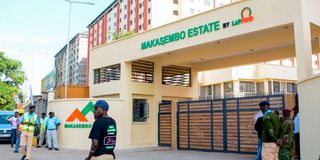Collaboration key in shaping urban future

The Makasembo Housing Project in Kisumu County on May 29, 2025.
What you need to know:
- Already, the rapid population growth has over-stretched existing infrastructure and services.
- Kenya’s urban centres are already incubating solutions that deserve national and even global attention.
Kenya stands at the crossroads of accelerated urban growth and climate urgency, calling for deliberate actions to ensure that Kenya’s vision for global transformation is resilient.
According to the population census captured by the United Nations Habitat, while only 27 per cent of the total population lives in urban areas, the urbanisation rate is high (4.3 per cent per annum) and projections indicate that more than half of the total population will be living in urban areas by 2050.
Already, the rapid population growth has over-stretched existing infrastructure and services, leading to the growth of informal settlements characterised by overcrowding, lack of basic infrastructure such as sewage, safe drinking water and decent housing, poverty, and inequality.
This challenge calls for a raft of measures and provides a unique opportunity to redefine how we think, plan and act on matters of urbanisation.
Kenya’s socio-economic progress
Urban development is no longer the sole domain of governments or planners, it is a shared responsibility that calls for genuine collaboration, strategic partnerships and open channels of knowledge exchange among all stakeholders, including national and county governments, the private sector, academia, civil society and communities.
It is no doubt that urban areas are the engines of Kenya’s socio-economic progress, yet they are also home to some of our most pressing challenges, including inequality, housing deficits, environmental degradation, infrastructure stress and vulnerabilities to climate shocks.
The Affordable Housing Programme is one of the initiatives that has been developed by the government to enable Kenyans access decent housing and improve their living standards .
The complexities of realising the dream of sustainable urban centres calls for leveraging the diverse perspectives, experiences and innovations of all the stakeholders.
Climate adaptation and urban resilience
As we speak, Kenya’s urban centres are already incubating solutions that deserve national and even global attention. Sustained efforts such as the establishment of Kenya Urban Forum are timely.
The forum provides a path towards inclusive planning and sustainable infrastructure to climate adaptation and urban resilience. It sets the stage for Kenya to localise global ambitions into implementable action.
In addition, the forum also focuses on actionable partnerships across levels of government and sectors. By strengthening vertical and horizontal collaboration, from national ministries to municipal governments, from startups to grassroots movements, the forum aims to unlock the full potential of integrated urban planning.
We must elevate our voices towards a common goal where we reward innovation and inspire replication of practices across all the cities in the republic of Kenya for us to have sustainable urban development.
The writer is a current affairs analyst.


